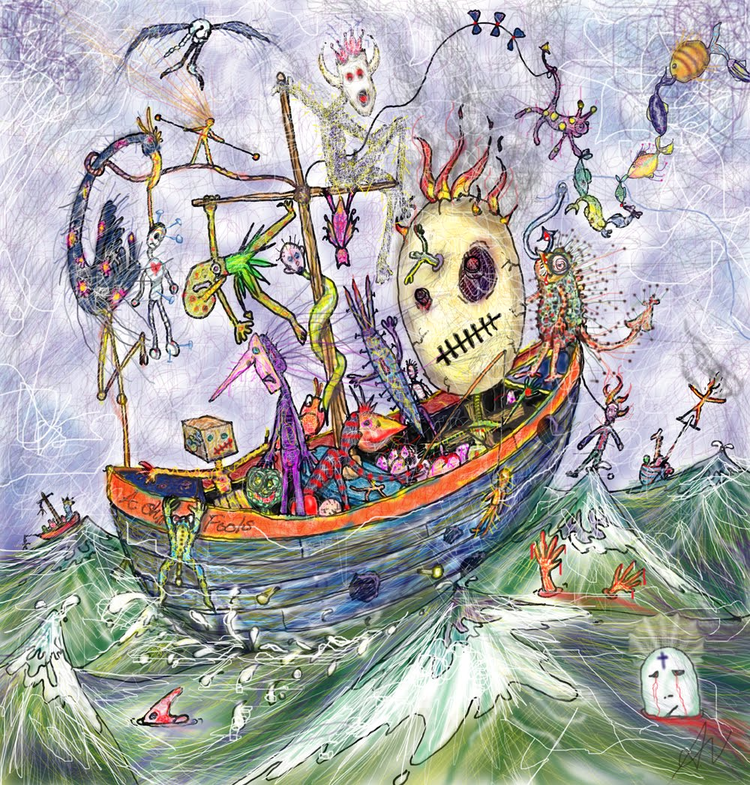
(...) Everything remained still for a moment, but then came the second knock, and the third. The fourth and fifth followed shortly after. Each time a bit faster, each time a bit stronger. The sixth made the entire door tremble as Timmy whimpered under his voice, still frozen in the corner of his bed. By the tenth knock, it was impossible to keep on counting. A barrage of strikes assaulted the door with deafening force as a thin stream of urine made its way down Timmy’s pants. He tried to scream, but by that point his voice had also abandoned him. The torment lasted for less than a minute but, to Timmy, it felt like ages. Then there was silence. As soon as he managed to muster the strength to scream, he wailed. His father came rushing into the room and turned on the light.
“Honey, it happened again,” said Timmy’s father to the woman walking groggily behind him.
“It’s okay, boy. You are okay,” he said as he held Timmy close to his chest.
“It... it ca- came,” Timmy whimpered.
Timmy’s father tried to hide the concern in his voice, but as soon as he noticed the small warm puddle on which he was standing, his fatherly tenderness was tainted by strokes of rage.
“You can’t keep doing this, Timothy. Not every night. You’re almost ten. This is not normal. This is not what normal kids do.”
Timmy tried to produce an answer, but only sobbing came out of his mouth. His father opened a drawer in Timmy’s night stand and took a couple of pills out of an orange bottle.
“Here, boy. Take these. We’ll go and see Dr. Zea tomorrow. We may need to change your prescription.”
Timmy was in no position to understand anything. His father lifted him up and changed his pants as the woman stared from the doorframe. He then put Timmy back in bed and lightly rubbed his head.
“You’re gonna sleep now, okay? No more games.”
Both adults walked out of the room and turned the lights off. Timmy remained motionless under his covers, staring blankly into nothingness (...)
Footnote #2: The Maddening
How do we deal with the mad? In older times, we may have put them into a ship and let them sail away with no compass so that they may be swallowed by the sea. We may have beheaded them or accused them of witchcraft. But we are not so barbaric anymore, are we? Now we just lock them up with the pretense of treatment and pump them with drugs until they become broken husks of their former selves. So humane we are. But why do we treat the mad in this manner? What crime have they committed to warrant such a stern punishment? One may argue that they are a danger to themselves and to those around them, and one may be right about that. However, it couldn’t possibly be that simple.

As a society, we rely on agreements to even have a chance of being able to exist in the same space. Legal agreements, moral agreements, monetary agreements and so on and so forth. We agree on what’s good and what’s bad, on what’s nice and what’s rude, we agree on what’s real and what’s not, and the entire history of human conflict could be boiled down to the moments in which these agreements were broken, or those in which no agreement was ever produced. We compromise, yes. But in order to keep us from tearing each other apart, at least some number of agreements must be held true and sacred by both parties.
This is why we prey on the mad. This is why we have so little regard for their lives. Because they disagree. It is not, however, the kind of disagreement a capitalist may have with a socialist, or a theist with a scientist. The mad disagree with reality itself. With our reality, that is. And that, we can’t forgive.
We feel so profoundly threatened by their reality, that we will go to great extents to keep them from even entertaining those thoughts and sharing them with us. When they’re lucky, we seal them away in white prisons where they can be ignored. And when they’re not so lucky, we ignore them nonetheless, but we do so with poise as we let them walk among us while we treat them like children. We look upon their lives with pity and condescension as if their very humanity was different, as if it was lesser, as if it was useless.

To deem someone as mad is quite probably the most severe form of violence we can inflict upon each other. It is a way of silencing, for their words will have no weight. It is a way of vanishing, for their lives will have no place. And it is a way of butchering, for they will never be complete again.
Deep down, we are all painfully aware of the implications of madness, and that is why the mere suggestion of our own madness is so viscerally unnerving. Thus, to become mad is, unsurprisingly, one of the most terrifying prospects we can possibly imagine.
This is where fiction can take some notes. The Maddening, to be understood as any force that would compel a character to become mad, is a tremendously powerful tool to convey dread. In practical terms, a mad character will be alienated and frowned upon. Everything he does or says will be questioned by his peers and, even more daunting, questioned by himself. Madness is the ultimate form of isolation; it is to put a character in such a state of helplessness that he will become a stranger among those who know him, a stranger even to himself.
The pathos of such vulnerability is universal, and if fictional horror manages to convey it, the results should be staggeringly effective.
Footnote #1: The Unknown
Footnote #3: The Cosmic

I really hope you enjoyed this piece. Please follow me if you did! @jean.racines
Image sources (in order of appearance): Image 1, Image 2, Image 3.
Further reading:
- Ahmad, A. (2010). Bordering On Fear: A Comparative Literary Study of Horror Fiction. Ottawa: Carleton University Press.
- Campbell, J. (1949). The hero with a thousand faces. Princeton: Princeton University Press.
- Lovecraft, H. P. (1973). Supernatural horror in literature. New York: Dover Publications.
- Mathiesen, T. (2004). Silently silenced: essays on the creation of acquiescence in modern society. Winchester: Waterside Press.
